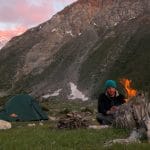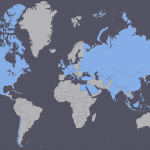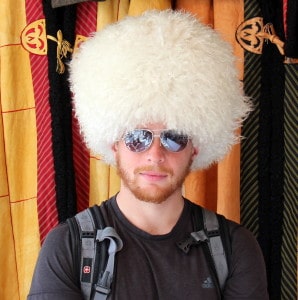As enjoyable as the city of Shakhrisabz itself is the day spent with my driver/guide to, in, and back from the town.
Abdullah found me trying to figure out the share-taxi system in Samarkand, and convinced me to ride with him. As the only English-speaker, about my age, with a good vibe he didn’t have much trouble.
We started with the standard polite small-talk.
“Where are you from? Oh, what state? You are a student, or do you work?”
Not that they aren’t genuine and expressing a real interest, but many other travelers also seem to answer each of these at least a couple of times a day. One of the reasons I started really studying at Chinese was after coming back from one of my first trips out of Shenzhen and deciding I wanted be able to get deeper than this initial conversation. My Russian is still nowhere near enough to move on, but pleasently his English is.
“I’m kind of between being a teacher and a student. I was teaching English in China for a while, left there in March to travel, and have to be back in America in August to start Law School.”
I’ve started lying these days, and claiming New Orleans as home. It’s not too much of a stretch, and far easier than trying to explain that I’m from Texan Louisiana, but that Southern Louisiana is an awesome place that everyone should visit.
“China? I have family doing business in China right now! They have gone with $30,000 each to buy tires. We will bring them back to Uzbekistan, sell them, and make $10 per tire! Normally I do business like this, but because today I have no business to do I drive people to make extra money.”
These are, of course, not his exact words. These are impressions that really stuck from the conversation. On the way to Shakhrisabz, we talk mostly about China and the fact that his family are paying far too much money per day to stay there. This transitions into talk about relative costs between America and Uzbekistan. The differences are as large as you might expect. He occasionally breaks off to listen in on the two women riding in the back, and tells me that he’s “learning things” by listening to them. I decide not to ask for elaboration.
On the outskirts of Shakhrisabz, we stop at Abdullah’s uncle’s animal feed store. The round of introductions, the handshakes while the left hand is covering the heart, the basic questions, and the handover of a bag from Abdullah to uncle.
Minutes later, at the foot of Timur’s ruined palace, we part ways.
“I have some business to do. We will meet in… an hour? Here is my phone number, if you need anything ask to use someone’s phone.”
A bit of exploring, a bit late, and I show up to our meeting point. Abdullah fills me in on the basic history of these places, and it occurs to me that I have read mostly the same in a guidebook the night before. On the ground this seems unimportant, but in retrospect the guidebook history has stuck with me more strongly than Abdullah’s. At the mausoleum, asked to buy a ticket, Abdullah plays the “starving student” card (his words, this time) for me. The woman waves us through.
The trip back to Samarkand. We pick up one woman who was supposed to get a ride to Samarkand with Abdullah’s friend, now to drunk to make the drive. We wait for (other) paying passengers as well: one woman and her two children. The boy is sitting in the middle seat, and keeps falling asleep on my chair and shoulder.
Stories about business, life, general knowledge.
“My brother has started college this year. Every year 18 students get scholarships, but they must do very well on a test to do so. So, we made sure he would do very well on his test. Otherwise, he could never have gotten a scholarship. We arranged three cell phones, with a professor on each. He reads the questions, and the professors tell him the answers. We paid each of them $1800 dollars, because it was cheaper than paying for the school. ”
On return to Samarkand, we drop the women and children off and look for a place to exchange money. I’m looking to exchange $200, enough (combined with what I have already) to pay or the rest of my two-ish weeks in Uzbekistan. Abdullah tells me he knows people who can do it for 2250 Som to $1, a bit better than the standard (foreigner) rate. I assume he probably got it for closer to 2300, but this works out pretty well for both of us so I dont complain. We pull up to a dark house in a dark neighborhood, and Abdullah tells me to wait in the car. I wait. He comes back out, asks for the money, and leaves me alone in the sedan once more.
Abdullah hands me a stack of roughly 6000 bills, seperated by rubber bands into incriments of 100,000 Som. In estimating how many are 500’s and still more 1000’s (the highest denomination), I realize there’s no way in can count this in the short time it will take to drop me back off at the hotel. Abdullah assures me there is no need to count, anyways.
I get out, we exchange emails, I pay the amount we had agreed on at the start of the day. I, of course, immediately count the money on return to my hotel room. It is, of course, all there.
I’ve got no witty or meaningful conclusion, other than to say that Uzbekistan has constantly been about making connections with people. This one reads as (hopefully) semi-interesting because he spoke enough English to carry on a conversation for the day. Even the interactions not based on language feel meaningful. Really, travel shouldn’t be about temples and medrassas and assorted historical buildings. It should be about this. People, friends, connections that even if they only last for one day still leave some residue on the memory.
Ok, that was a little corny. Take it as you will.




